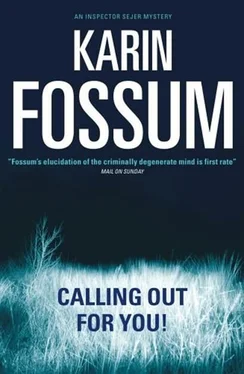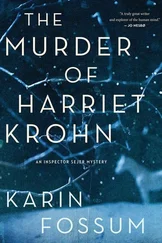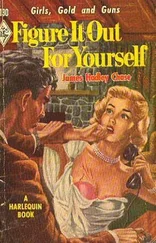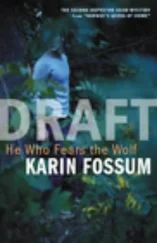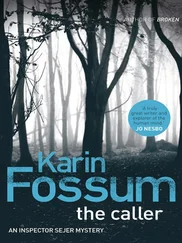Gunder had no wish to go home to the empty house. He would rather have stayed at the police station, in Inspector Sejer's office, the whole night. Close to the jewellery. Accessible in case someone should turn up with definitive information about the woman who had died. It couldn't be Poona! After all, he had not been allowed to identify her. I'm a coward, Gunder thought, I should have downright insisted. He thanked the policewoman and shuffled up the steps. He did not bother to lock the door behind him. He went into the living room, took out the photograph of Poona and himself from the drawer where he had hidden it. He looked at the yellow bag. What if they were wrong? They must have made hundreds or thousands of those banana-shaped bags. Marie, he thought, my job. Everything's falling apart. What did the man on the plane say? The soul remains at Gardermoen airport. Gunder understood now what he meant. He sat at his desk, a crumpled shell. He got up, sat down again and then wandered restlessly about the house. A flittering moth searching for the light.
The police station was buzzing. Thirty men working at full stretch. They were all outraged at what had happened. A foreign woman wearing a Norwegian filigree brooch had arrived here, newly wed perhaps. Someone had attacked her as she neared her new home. They wanted to solve this crime, get the man. Their unspoken unanimity straightened their backs and steadied their gaze. First, the press conference. It robbed them of precious time, but they wanted to look the Norwegian people in the eye and say: "We will take care of this."
Sejer would have preferred not to be there, facing the reporters and their cameramen. A little metallic forest of microphones on the table. He recognised the ominous itching. He suffered from eczema and it was always worse when he felt ill at ease. Holthemann, his head of department, was sitting on his left and Karlsen was on his right. There was no escape. The demands of the media and the nation had to be satisfied: photographic material, investigation strategy, updates, information about the composition of the team, their experience, previous cases they had investigated.
Then the bombardment began. Did they have a suspect? Were there any clues which might suggest a motive? Had the woman been sexually assaulted? Had she been identified? Was there any significant forensic evidence from the crime scene? Had it been established where the woman was from, or her age? How many leads did they have? Had they yet carried out door-to-door interviews? And how great was the risk that the killer would strike again?
How the hell would I know? flashed through Sejer's mind. What could he say, if anything, about the murder weapon? Was it possible that the killer had left no trace at all? This witness on a bicycle, was that someone from the village? Furiously they scribbled. Sejer put a Fisherman's Friend in his mouth. His eyes watered.
"When will the post-mortem report be ready?"
"Not yet. When it is, it will be comprehensive."
"Would it be possible to take pictures of her?"
"Absolutely not."
Silence, as everyone's imagination worked overtime.
"Are we to understand, then, that you consider this a particularly brutal crime? In the context of the history of Norwegian crime in general?"
Sejer looked over the crowded room. "I do not think it would be constructive to compare unrelated cases, in terms simply of brutality. Not least for the sake of the deceased. Nevertheless, I am willing to say that, yes, there is in this killing evidence of a degree of savagery which I have not had to witness at any time hitherto in my career as a policeman."
He could already see the headlines. Simultaneously, he thought of all the things he could have achieved during the hour the press conference lasted.
"As to the killer," someone piped up, "are you working on the assumption that the man or men are local?"
"We're keeping an open mind."
"How much do you know that you're not telling us?" a woman said.
Sejer could not help smiling. "A few minor details."
At this point he spotted Skarre at the back of the room. His hair was standing straight up. He was trying to keep calm while the last questions were being answered. Holthemann too, sitting beside him, had noticed Skarre. He leaned towards Sejer and whispered, "Skarre's got something. He's gone bright red."
Finally it was over. Sejer whisked Skarre with him down a corridor.
"Tell me," he said, out of breath.
"I think I got something. From a minicab office. On August 20th at 6.40 p.m. one of their cabs drove from Gardermoen airport to Elvestad. The manager gave me the name of the driver. His wife answered and says he'll be home soon. She'll get him to call straightaway."
"If that driver had half a brain he'd have got in touch with us long ago. What's his name?"
"Anders Kolding."
"A taxi from Gardermoen to Elvestad? That would cost a fortune, wouldn't it?"
"Between 1,000 and 1,500 kroner," Skarre said. "But don't forget that Jomann had given her money: Norwegian as well as German."
They waited, but no-one telephoned. Sejer gave him thirty minutes, before dialling the number. A man answered.
"Kolding."
"This is the police. We gave your wife a number and we have been waiting for you to call."
"I know, I know."
A young voice. Turmoil in the background. The cries of a squalling child could be heard.
"We want you to come down to the station."
"Now? Right now?"
"Right this minute, if possible. Tell me about this ride from Gardermoen."
"I drove a foreign lady to Elvestad. Now, where was it? Blindveien. But there was no-one at home. So she got back into the cab and asked me to drop her in the middle of Elvestad. By the café."
"Yes?"
"That's where she got out."
"She got out by the café?"
"She went into the café, to be precise. It's called Einar's Café," he said.
"Did you see her after that?"
"Hell, no. I drove back."
"Did she have any luggage?"
"One heavy brown suitcase. She only just managed to drag it up the steps."
Sejer pondered this. "You didn't help her?"
The angry cries rose and fell in the background.
"What's that?"
"So you didn't help her with her suitcase up the steps?"
"No, I didn't. I was in a hurry to get back to town. That's a long way without a fare."
"And that was the last time you saw her?"
"That was the last time."
"I'll be expecting you, Kolding. There's a chair waiting here for you."
"But I've got nothing more to tell you. The wife needs to go out and my kid's hysterical. It's a really bad time."
"You've just become a father?"
"Three months ago. A boy."
He didn't sound overjoyed at this development.
"Bring him with you," Sejer said. "Simple as that."
"Bring the kid?"
"I expect you'll have a baby carrier."
He hung up and turned to Skarre.
"I'll deal with Anders Kolding," he said. "You go to Einar's Café."
*
Gunder dragged himself to the telephone. He dialled the office's number and Bjørnsson answered.
"It turns out," he stammered, "that I need a few days at home. I'm not a hundred per cent. And my sister is still in a coma. I'll have to get a sick note."
Bjørnsson was surprised. "Perhaps you caught something in India."
"It was very hot there. Perhaps I did."
Bjørnsson told him to get well soon, spotting an opportunity to poach some of his customers.
Gunder called the hospital and the friendly nurse answered.
"There's no change, I'm afraid," she said. "Her husband's just left. He had things to do at home."
"I'm coming over right away."
"Only if you can manage it," she said. "We'll call if there's any change."
Читать дальше
